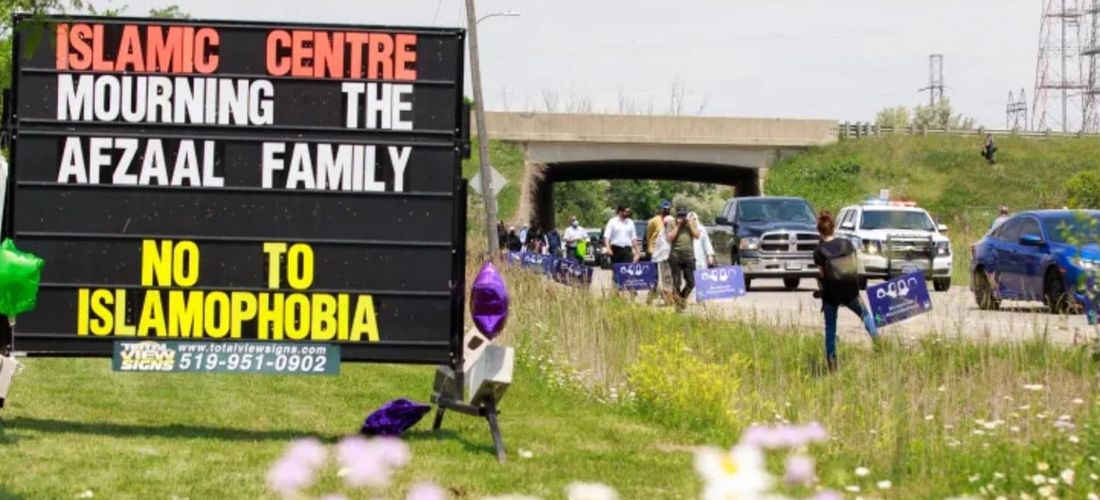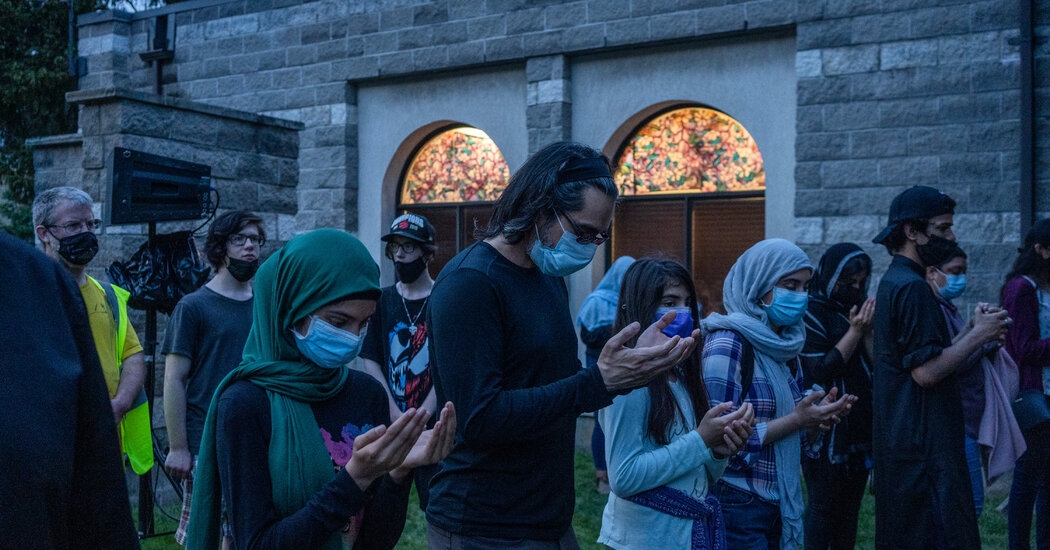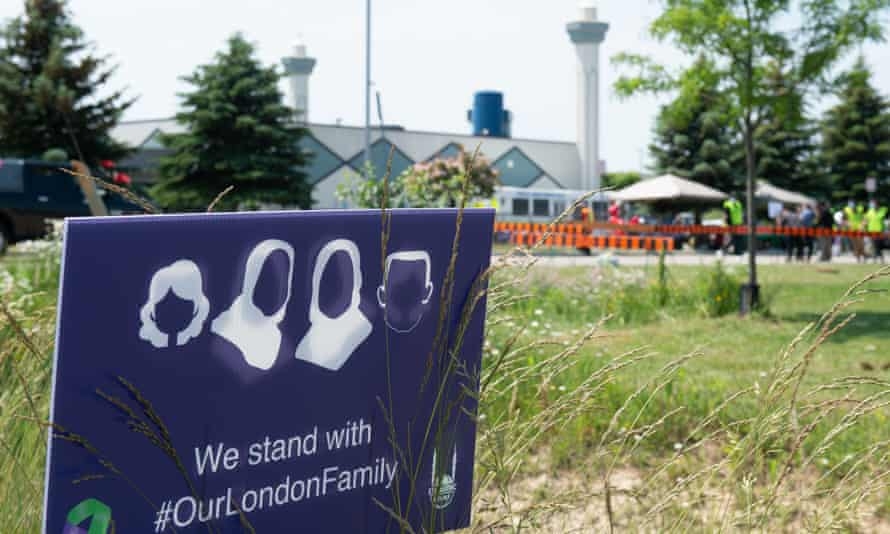Grieving the Afzaal Family in Canada & Why We Need Legal Recourse for Islamophobic Violence
Current Events
|
Jun 15, 2021
|
6 MIN READ

Image source: CBC (Canadian Broadcast Corporation) on Twitter
Editor's note: We are proud to collaborate with Mommying While Muslim, an award-winning podcast focusing on parenting and Muslim life, for a monthly column on The Haute Take. Each month MWM co-hosts Uzma Jafri and Zaiba Hasan will be writing a column for The Haute Take on Muslim parenting and other topics.
By Dr. Uzma Jafri
While North American Muslims may have some closure with the funerals of the Afzaal family in London, Ontario this past weekend (who were deliberately mowed down and killed by a 20-year-old in what Candian Prime Minister Justin Trudeau is calling a “terrorist attack”), we all know the actual process of grief is longer. For a newly orphaned nine-year-old Fayez, the youngest son and only surviving member of the Afzaal family, it may never happen at all.

How does one wrap their head around such an evil act of hate? What are we to tell our children? When we learned Elizabeth Kubler-Ross’ stages of grief in school, many of us thought that at “acceptance,” we would be done. But not so. How can Muslims in the United States and Canada or anywhere that Islamophobia exists ever reach acceptance?
The three days of grieving Muslims observe are not enough to process the collective trauma of this incident or the many acts of violence and hate that came before it. Nor can Muslims rely solely on prayerful faith to help them come to terms. It will take more:
"Whosoever of you sees an evil action, let him change it with his hand; and if he is not able to do so, then with his tongue; and if he is not able to do so, then with his heart – and that is the weakest of faith.” [Sahih Muslim]
There’s work to do, but what are we going to do about it? Big sigh and fold our hands until the next attack and bear the media attention for when that happens? No, we look for recourse instead of reaction.
Islamophobia Increasing But Not Being Reported
Having read countless testimonies this past week online from both Canadian and American millennials’ experiences of Islamophobia, we know that our community’s pain has been underwhelmingly heard, poorly supported or hardly validated. It has been painfully represented however. Worse, too little about Islamophobia and the effect it has on Muslims has been studied.

Image source: Majestic PR
As more research is done on the mental and emotional states of Muslims in the West and the impact of Islamophobia on them, we will have data to support what these young adults are telling us.
At least on the most preliminary basis, we see a correlation between the last four years in the United States (under the Trump presidency) and the rest of the rest of the world. We observed increased anti-Muslim bias in parallel with the anti-Muslim rhetoric spewed since 2015. We saw Islamophobic incidents surpass their prior records after 9/11. A huge surge in specifically violent Islamophobia occurred in 2018 in the United States, and Canada found Islamophibc incidents increased 253 percent over three years in 2015. Mainstream communities have become less religiously tolerant, and leadership that racialized Muslims and often promoted anti-Muslim bias itself did not help.
Most Islamophobia isn’t reported here in the West. Racialized, marginalized and stigmatized communities of Muslims are fearful of the burden of proof. There is mistrust of authority because those in it are the ones stereotyping and racializing them in the media. Local law enforcement usually do not have clear guidelines about anti-Muslim hate crimes or even hate crimes themselves in the United States. How can a community they’ve learned to fear be the victims?
What is Legally Recognized as a Hate Crime?
The 1990 Hate Crimes Statistics Act commissioned the FBI to collect hate crime data, but no state is required to provide it. When local police do not use the label “hate crime,” the state will not report it, and no recourse is taken to correct it. Less than half of all hate crimes are reported by the most generous estimates, and less than four percent result in an arrest. Imagine how few are prosecuted.
The definition of a hate crime also differs state to state in the U.S., whereas in Canada it’s nationally defined and uniformly prosecuted, albeit with a maximum penalty of up to two years in prison for inciting hatred. Most hate crimes in Canada are penalized with a fine or probation. Recourse is minimal.
In 2020, 25 percent of the biggest cities in the United States reported “zero” hate crimes, which is statistically impossible when more than 11 million people live in each one. Furthermore, 12,000 local law enforcement agencies did not report a single hate crime to the FBI. If anyone was paying attention in 2020, hate crimes happen ALL THE TIME in America, from small towns to big cities. Nothing is done about it.

Image source: Anadolu Agency/Getty Images via Instagram
To its credit, Europe provides a more robust annual report of anti-Muslim bias related incidents. In 2019, 29 nations reported a total of 511 incidences of anti-Muslim bias, and 165 of them were violent Islamophobic attacks. Such databases do not exist in North America, however, for the reasons I wrote above. We need better definition, documentation, prosecution, and hopefully, elimination of this globally growing problem.
As Muslim moms, short of internment, one of our worst nightmares is to lose our kids to a violent Islamophobic act. What happened to the Afzaal family breaks our collective hearts and shakes us with fear, anger and grief. Yet preventive legislation is nonexistent. However, now Canada is creating recourse in the wake of its most recent violent act of Islamophobia.
A Path Towards Recourse
The National Council of Candian Muslims – their version of the Council on American Islamic Relations – drafted a letter to Trudeau for an emergency National Action Summit on Islamophobia before July. The motion passed, Alhamdullilah. The fact that Canada's reported Islamophobia increased by 253 percent meant that at baseline, it probably was being documented about as well as it was in the United States, which in most cases was not at all.
Better reporting of hate crimes and harsher prosecution of it is a major step towards deterring similar incidents in the future. Federal legislation can only come from everyone working towards a common goal, which is protecting ALL of its citizens in a democracy.
Canada has been put to the test and currently is steering toward positive recourse. Is the same thing possible in the United States? How many violent Islamophobic attacks does it take to make a law or even national recognition that this is a huge problem?
Right now, we can ask our governors and state lawmakers to enact more expansive definitions of hate crimes, pay for improved training of local law enforcement to report them, and write harsher punishments for them. A global precedent needs to be set, even if Canada beats us to it.
If we can do so, Muslims will win better protection, and moms and kids will be safer, Insha’Allah. That’s our goal at the end of the day. The time is now for us to skip “acceptance” and name the next stage of grief "recourse," and make sure we create safety for all.
To donate to a fund set up to help Fayez and organize a sadaqa jariya project on behalf of the Afzaal family, click here.
Dr. Uzma Jafri is originally from Texas, mom to 4 self directed learners, a volunteer in multiple organizations from dawah resources to refugee social support services, and runs her own private practice. She is an aspiring writer and co host of Mommying While Muslim podcast, tipping the scales towards that ever elusive balance as the podcast tackles issues second generation Americans have the voice and stomach to tackle.
Subscribe to be the first to know about new product releases, styling ideas and more.
What products are you interested in?

